Alena Alamgir (University of Exeter; Universität Leipzig), “Pletou svetry a odmítají se řídit pokyny mistra”: Kolektivní protesty vietnamských dělníků v osmdesátých letech v Československu“
Na jaře roku 1983 vypukla v Československu dvanáctidenní stávka, kterou zorganizovala skupina vietnamských dělnic v jednom z rostlinářských závodů. Tato stávka odhalila značné rozdíly mezi Vietnamci a jejich československými „hostiteli“ v porozumění takovým pojmům jako „pracovní morálka“ nebo „socialistický internacionalismus“. Poukázala tak, že mezi československým a vietnamským pojetím socialismu panovaly značné rozpory. Mimo to nám však tato událost také poskytuje cenný vhled do života vietnamských pracovníků v Československu v osmdesátých letech a vypovídá mnoho o povaze a realitě československého pozdního socialismu. 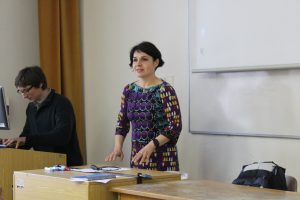 Pracovní migrace mezi někdejšími socialistickými státy před rokem 1990 dosud patřila spíše k zanedbávaným tématům historického výzkumu. Nemnohé práce, které na této téma vznikly, navíc většinou ignorují významnou skutečnost, že zahraniční dělníci často upozorňovali na nedodržování svých pracovních práv a také je v dobovém kontextu hostitelské země zcela neobvykle otevřeně hájili. Právě tomuto aspektu se na základě analýzy pramenů jako jsou policejní spisy nebo ústní svědectví pamětníků bude věnovat tato přednáška. Opomenuty nebudou ani strukturální rysy vietnamsko-československéh
Pracovní migrace mezi někdejšími socialistickými státy před rokem 1990 dosud patřila spíše k zanedbávaným tématům historického výzkumu. Nemnohé práce, které na této téma vznikly, navíc většinou ignorují významnou skutečnost, že zahraniční dělníci často upozorňovali na nedodržování svých pracovních práv a také je v dobovém kontextu hostitelské země zcela neobvykle otevřeně hájili. Právě tomuto aspektu se na základě analýzy pramenů jako jsou policejní spisy nebo ústní svědectví pamětníků bude věnovat tato přednáška. Opomenuty nebudou ani strukturální rysy vietnamsko-československéh
Frank Gerits (Utrecht University), „JFK’s and LBJ’s Efforts to Transform the Anticolonial Project in Africa (1960–1966)“
President John F. Kennedy is often cast as a supporter of African nationalism. In the most recent books, Kennedy and his aides emerge as people who were perceptive enough to distinguish communism from nationalism but lacked the sensitivity to acknowledge the adverse effects of the modernisation they promoted. 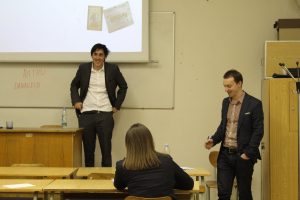 New research, however, reveals that Kennedy’s commitment to modernisation theory included a profound concern about psychological changes that would be unleashed by the modernization project itself. The United States Information Agency (USIA) therefore played an important role in managing the modernisation process. Not only Kennedy, but also LBJ saw anticolonial nationalism as first and foremost an emotional and psychological problem. The LBJ White House expanded upon Kennedy’s approach by committing to persuading Africans of the need for regional integration as a means to deal with the negative side effects of nationalism and modernization.
New research, however, reveals that Kennedy’s commitment to modernisation theory included a profound concern about psychological changes that would be unleashed by the modernization project itself. The United States Information Agency (USIA) therefore played an important role in managing the modernisation process. Not only Kennedy, but also LBJ saw anticolonial nationalism as first and foremost an emotional and psychological problem. The LBJ White House expanded upon Kennedy’s approach by committing to persuading Africans of the need for regional integration as a means to deal with the negative side effects of nationalism and modernization.
Natalia Telepneva (University of Warwick), „Czechoslovakia and the End of Portuguese Empire in Africa, 1961–1975“
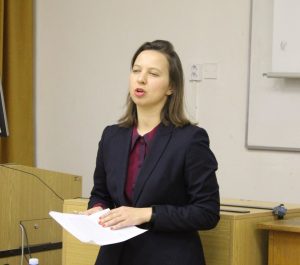
This lecture focuses on the role of Czechoslovakia during the anti-colonial campaigns in Portuguese Africa – Angola, Mozambique and Guinea-Bissau – between 1961 and 1975.
Natalia Telepneva explains why Czechoslovakia became the first country to support the anti-colonial movements in Portuguese Africa in 1961, the role of secret intelligence, relations with the Soviet Union, and the consequences of 1968 for Czechoslovak international engagement. Telepneva’s talk will also emphasise the role of Czechoslovak agency in the Cold War in Africa.
Wendy Z. Goldman (Carnegie Mellon University), „Starvation, Rationing, and Black Markets in the Soviet Union During World War II
How did the Soviet people survive the war? After the Nazi invasion, the Soviet state quickly established a hierarchical rationing system to ensure food to the population. Yet the loss of the occupied territories created severe shortages. By 1942, people had begun to starve. Even industrial workers, who received the highest rations, were living on a single bowl of cabbage soup a day. Food shortage prompted the growth of black markets and theft, from petty pilfering to large scale embezzlement. Some officials siphoned food from workers to create new hierarchies to benefit themselves. Others redistributed food to help more poorly-provisioned groups like orphans and white collar workrs. The ration system, which ultimately proved successful, was established by the state and remade in practice in a constant struggle over food.
Giles Scott-Smith (Leiden University), „Looking for Lagonia: On ‘Imaginary Bridges’ and Cold War Boundaries“
On 28 May 1987 the West German teenager Matthias Rust took off in his single-engined Cessna from Helsinki’s Malmi airport and headed out over the Gulf of Finland.  Within half an hour he changed course, heading instead for the Estonian coast. Several hours later he landed his plane on Red Square, the centre of Moscow. His escapade caused a sensation and had major political ramifications in the Soviet Union. This lecture looks at Rust’s background, his motivation, and how we might interpret its meaning within Europe’s experience of the Cold War.
Within half an hour he changed course, heading instead for the Estonian coast. Several hours later he landed his plane on Red Square, the centre of Moscow. His escapade caused a sensation and had major political ramifications in the Soviet Union. This lecture looks at Rust’s background, his motivation, and how we might interpret its meaning within Europe’s experience of the Cold War.
Giles Scott-Smith (Leiden University)
Seminář na téma: Cold War Cultural Lines: The Congress for Cultural Freedom, the Obor Foundation, and the Campaign to Create a Liberal Public Sphere in SE Asia
The seminar will cover the campaign of the Congress for Cultural Free- dom (CCF) to establish a global liberal intellectual community as part of the Cold War contest of ideas with the communist world. A central part of this campaign were the many journals set up or supported by the CCF around the world, some of which still exist today. The semi- nar will discuss the research on those journals from the recent book, Campaigning Culture and the Global Cold War, and then look in detail at one of the most interesting developments that came out of the CCF campaign – the Obor Foundation of Ivan Katz, and the attempt to pursue the CCF agenda by other means in SE Asia from the 1970s onwards.
Daniela Richterová (Brunel University London), „Terorista Carlos Šakal v Prahe – neľahká výzva pre ŠtB“
Vzťahy medzi spravodajskými službami a medzinárodnými teroristami patria k najstráženejším tajomstvám štátov – demokratických či autoritárskych. Dlhé desaťročia bol takýmto tajomstvom aj vzťah socialistického Československa k jednému z najvýraznejších teroristov dvadsiateho storočia – Ilichovi Ramírezovi Sánchezovi prezývanému Carlos Šakal. Vďaka dokumentom z viacerých československých archívov vieme dnes o Šakalových pobytoch v Československu viac než kedykoľvek predtým. Išlo o vzťah plný paradoxov a zvratov. V období rokov 1978 – 1986 Šakal a jeho komplici navštívili Prahu viackrát. 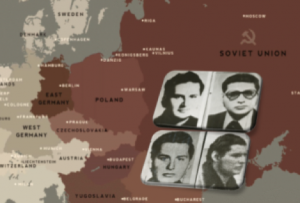 Či išlo o dovolenku alebo o pracovné stretnutia, Štátna bezpečnosť im bola v pätách. Aj keď zo začiatku si ŠtB udržiavala odstup a sledovala venezuelského teroristu iba z diaľky, postupne bol Carlos čoraz známejší a nebezpečnejší, preto sa Praha rozhodla jeho návštevám v Československu zabrániť. V prednáške se bude diskutovať o tom ako a prečo sa postoj zdanlivo všemocnej ŠtB voči Carlosovi Šakalovi postupne menil a poukáže na problémy, ktorým musela ŠtB čeliť pri sledovaní tohto výbušného ‘marxistu‘, ktorý sníval o svetovej sláve a nádejal sa, že si získa podporu Moskvy. Cieľom prednášky je spochybniť teóriu z konca studenej vojny, podľa ktorej Moskva a jej satelity bezhranične podporovali medzinárodný terorizmus namierený proti Západu.
Či išlo o dovolenku alebo o pracovné stretnutia, Štátna bezpečnosť im bola v pätách. Aj keď zo začiatku si ŠtB udržiavala odstup a sledovala venezuelského teroristu iba z diaľky, postupne bol Carlos čoraz známejší a nebezpečnejší, preto sa Praha rozhodla jeho návštevám v Československu zabrániť. V prednáške se bude diskutovať o tom ako a prečo sa postoj zdanlivo všemocnej ŠtB voči Carlosovi Šakalovi postupne menil a poukáže na problémy, ktorým musela ŠtB čeliť pri sledovaní tohto výbušného ‘marxistu‘, ktorý sníval o svetovej sláve a nádejal sa, že si získa podporu Moskvy. Cieľom prednášky je spochybniť teóriu z konca studenej vojny, podľa ktorej Moskva a jej satelity bezhranične podporovali medzinárodný terorizmus namierený proti Západu.
Paschalis Pechlivanis (Utrecht University), „The United States, Eastern Europe and the policy of differentiation from Nixon to Carter.“
Cold War historiography has long neglected American foreign policy towards Eastern Europe. A significant factor for this historiographical oversight is that Eastern Europe was overshadowed by its hegemonic patron, the Soviet Union. 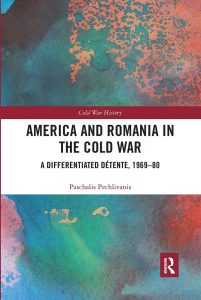 Hence, also due to the ‘bloc’ or ‘satellite’ perception of the socialist world by the West, US considerations regarding Eastern European regimes appear only in passing in most landmark historical treatises of US foreign policy, which inevitably focus on the struggle of both superpowers for the hearts and souls of mankind. The aim of this talk is to discuss a certain aspect of American foreign policy in Eastern Europe, namely the policy of ‘differentiation’ as it was implemented by the administrations of Nixon, Ford and Carter, respectively. In this light, the lecture will explore whether US foreign policy during the Cold War was more nuanced than the common East vs. West narrative suggests.
Hence, also due to the ‘bloc’ or ‘satellite’ perception of the socialist world by the West, US considerations regarding Eastern European regimes appear only in passing in most landmark historical treatises of US foreign policy, which inevitably focus on the struggle of both superpowers for the hearts and souls of mankind. The aim of this talk is to discuss a certain aspect of American foreign policy in Eastern Europe, namely the policy of ‘differentiation’ as it was implemented by the administrations of Nixon, Ford and Carter, respectively. In this light, the lecture will explore whether US foreign policy during the Cold War was more nuanced than the common East vs. West narrative suggests.
Ala Al-Hamarneh (Orient-Institut Beirut), „Global South“ Students in the Eastern Bloc during the Cold War – from Geopolitics to History“
Discussing and analyzing the impacts of the “Cold War” in/from a Third World/Global South perspectives is rather a new approach in humanities and social sciences, but especially in history, political sciences, development studies and political geography. Theorizing the global south within the cold war includes new approaches and new interpretations of existing concepts such as “decolonization”, “anti-colonialism”, “neo-colonialism”, “dependency”, “nation building”, “hegemony”, “global systems theory”, “security”, “development”, “modernization”, “globalization”, “capital accumulation” etc. The lecture aims to outline the main conceptual approaches of studying the cold war/global south nexus by exemplifying the case of former students from the Arab countries in the Eastern Bloc countries.